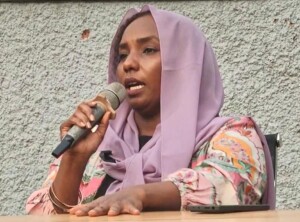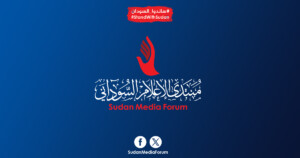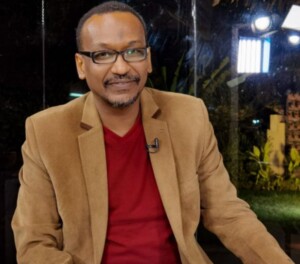Investigation into Sudanese press who met with EU and US diplomats begins
On Tuesday, the State Security Prosecution in Khartoum started investigations against five journalists on a complaint filed by the National Intelligence and Security Service (NISS) after the journalists met meeting with a delegation of EU and US diplomats earlier this month.
 A newspaper stand in Khartoum (File photo)
A newspaper stand in Khartoum (File photo)
On Tuesday, the State Security Prosecution in Khartoum started investigations against five journalists on a complaint filed by the National Intelligence and Security Service (NISS) after the journalists met meeting with a delegation of EU and US diplomats earlier this month.
Journalist Ashraf Abdelaziz, the editor-in-chief of El Jareeda newspaper, told Radio Dabanga that the prosecutor asked them questions and queries about what happened in the meeting with the ambassadors of the European Union and the charge d’affaires of the US embassy in Khartoum.
He said that they explained to the prosecutor that the meeting was an informal one; a luncheon in honour of the World Press Day in which the talk about the press situation in Sudan came in a normal context, explaining that the Western embassies are familiar with the details of what is happening in Sudan through specialised offices that monitor newspapers and social media.
He stressed that the statement issued by the EU after the meeting dealt with what was discussed in a transparent manner.
He pointed out that the meeting falls within the framework of meetings organised by the European embassies in Khartoum with journalists. Some of them are pro-government.
He said that the journalists who were investigated were Shamayel El Nour, Maha El Tilib from El Tayyar newspaper, and Lina Yagoub from El Sudani newspaper in addition to himself, while the editor of El Tayyar, Osman Mirghani was not investigated for health reasons.
Confiscation
Regarding the confiscation of the print run of El Jareeda newspaper on Tuesday by the security apparatus, Abdelaziz said that the representative of the apparatus notified them that the reason is a column written by journalist Taha Mudasir including, according to the evaluation of the apparatus on sharp words, however, Abdelaziz considered the column ordinary and falls within the framework of freedom of expression, but criticized the situation in the country in general.
Columnist Taha Mudasir criticised on “what is behind the words”, the economic performance of the government in a cynical manner.
The Journalists Association for Human Rights (JAHR) earlier condemned the summon of some journalists by the State Security Prosecution and questioning them about fabrications such as defamation of the government and harmful lies, considering that as a blatant attempt to break the will of the journalists and blackmail them to prevent them from their constitutional right to expression, organisation and meeting with any party
Journalist Feisal El Bagir said the journalists’ duty is to meet with community leaders, politicians, civilians, members of civil society organisations, native leaders and diplomats and to communicate with any source inside and outside Sudan to express the issues of society, which is a constitutional right.
Meeting
On 2 October, a number of European ambassadors and the US Chargé d’Affaires met with a number of editors-in-chief and journalists to discuss press freedom in the country.
In a statement released after the meeting, EU Ambassador Jean-Michel Dumond said he would discuss the situation of the press in the country with the Sudanese government. He pointed to the 2020 election and the importance of human rights and democracy in the country.
In response, Dumond was summoned by the Ministry of Foreign Affairs. The Ministry said in a statement later that they told the EU ambassador that the way the meeting was organised exceeded diplomatic norms and guidelines.
The Ministry also expressed its surprise that the meeting addressed “unresolved issues such as [the recent amendments to] the Press and Publication Act, which is still being debated by the institutions concerned”.
Ongoing media curbs
The Media in Sudan are continuously subjected to confiscations of newspapers, and summons and detentions of journalists.
In the end of June, the cabinet extended the power of the government-controlled Press and Publications Council as well as restrictions on the media to online news outlets, when it passed amendments of the Media and Publication Act. A month later, the NISS restored prior-censorship of newspapers.
In early August, editors-in-chief and the head of the NISS in Khartoum agreed in a meeting to form a committee to deliberate on the so-called red lines set by the security apparatus for Sudanese media. New confiscations of newspapers were therefore briefly suspended.
However, the NISS began gagging the press again on August 27, when the print-runs of El Jareeda and El Tayyar were confiscated. No explanations were given. Four days later, NISS officers stopped the distribution of El Jareeda and El Tayyar again, together with the print-run of El Rai El Aam, without stating a reason.
Abdelaziz told Radio Dabanga at the time that “in the past there used to be ‘red lines’ not to criticise the president or vice-presidents of Sudan, members of the security apparatus, and the police. However, these lines have become very unclear and unpredictable now”.
In early September, three young journalists were summoned by security agents in Khartoum and El Gedaref. A Sudanese reporter was banned from writing. The print-run of El Saiha daily, the newspaper he was writing for, was confiscated on September 8.
Sudan is ranked at the bottom of the World Press Freedom Index by Reporters Without Borders.











 and then
and then